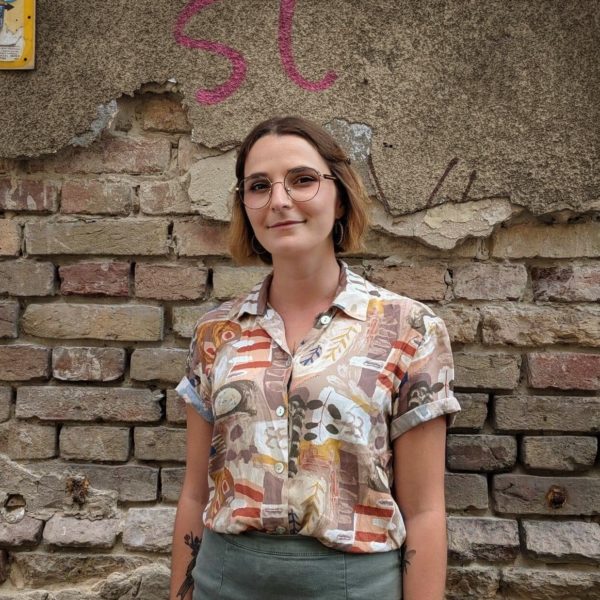25 October 2019
Meet the 2019 Deakin University Nonfiction Prize shortlist – Dženana Vucic

Dženana Vucic, 28, VIC/QLD
‘A Teleology of Folding, and of Dying’
How did you begin writing?
I don’t really remember a time when I didn’t write. When I was a kid, I wrote these very convoluted fantasy stories about badass girls with magical powers (including a 60+ page manuscript that my mum sent off to Penguin… needless to say, it did not get published), and then in my teenage years I wrote a lot of angsty poetry and overwrought short stories… actually, that lasted well into my twenties, if I’m honest. I’ve never not written, but writing as something I sit down to do with a sense of intentionality/purpose only came to me in the last couple of years, after I had grown more politically and socially conscious and, inevitably, more frustrated. I began writing proper, I think, as a means to direct that frustration into something (hopefully) useful.
Why do you write nonfiction?
Because there’s so much to say about the world as it is, about our material conditions and about how our world is being shaped by those whose material conditions allow them to do so. Nonfiction, and specifically creative nonfiction, is a means of addressing the structures that move us, often without our knowledge, sometimes against our will. I write autobiographically as a means of locating myself within the larger discourse and making clear the positionality from which I speak (a cis, white, bisexual, refugee, kind-of-Muslim woman living in the West).
Tell us a bit about your submission to the Deakin University Nonfiction Prize:
‘A Teleology of Folding, and of Dying’ is my attempt to grapple with the prevalence of Islamophobia today, and to contextualise it. It is an attempt, too, to come to some kind of understanding about my Muslim identity. I came to Australia as a refugee from the Bosnian war and so I’ve always been particularly sensitive to ‘issues’ surrounding Muslims and their changing representation in the media (especially, it goes without saying, after 9/11). My piece is an incomplete account of the ways in which Muslim lives are being destroyed in the service of politicking, and a reminder that this has happened before, to devastating effect.
Why did you choose to write on this subject?
I’d been working on an autotheoretical manuscript about myth, memory and the Bosnian war when the Christchurch terrorist attack happened and everything felt suddenly so loud and high-res. It was so very very close and yet also incredibly far away – I had experienced Islamophobic violence during the war but, since ‘assimilating’ into Australian culture, I have been protected by my whiteness and lack of religiosity from the vitriol and abuse that Muslims of Colour face. It was a moment of vertigo, this sudden and acute understanding of just how arbitrary the lines we draw around one another are, and how self-serving. I wanted to express that. Bosniaks were portrayed as jihadist Muslims during our war in order to justify genocidal murder and rape. Refugees are portrayed as possible ISIS terrorists in order to justify Australia’s refusal to let them exercise their human right of seeking asylum here.
Christchurch was the culmination of the racist, Islamophobic rhetoric espoused by governments and media in order to achieve the political end of Keeping Them Out. And in turn, it condoned the abuse and violence perpetrated against Muslims in Australia, and around the world. There are genocides happening right now, happening because the West has turned Muslims into the monstrous ‘Other’, and because we refuse to intervene unless there’s something in it for us. This piece was written in fury and hurt and disappointment; it was less choice than compulsion.
What’s the best piece of writing advice you’ve ever received?
It sounds very naff and perhaps somewhat reductive to say it but it was probably being told to just write, and to write every day. I used to find that line really patronising, especially when I was struggling with my mental health, working thirty hours a week and studying full time. It seemed impossible that I could ever find the time, or the energy. But I’m in a much better headspace now, and that’s really helped with finding that time, that energy. I definitely don’t write every day (there’s still work and uni and y’know, life to contend with), but I try to. And it’s really helped; the more I write, the more I’m able to write. That’s the thing though, before advice like ‘write every day’ can be meaningful, you have to have the bandwidth to write every day, outside of time constraints and life logistics. I guess if I were to pass that advice on, I’d do it with the acknowledgement that it’s really hard to do when you’re depressed or anxious or stressed, and more important than sitting down and staring at a blank screen for half an hour every day is looking after your mental health.
Who are some of your favourite nonfiction writers?
I’m a huge fan of autotheory — writing that blends autobiography with theory — and my favourite nonfiction writers work in that style. People like Maggie Nelson, Paul B Preciado and Claudia Rankine, to name a few.



